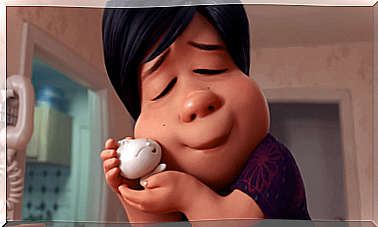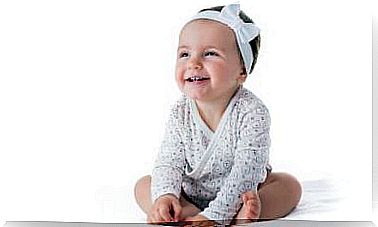Feelings That You Transfer To Your Baby

Feelings that you pass on to your baby affect their development. For example, if the mother is happy, sad, stressed, or struggling with depression, it can be either harmful or beneficial to the baby, depending on the type of emotion. Here we show you feelings that you pass on to your baby, whether they are good or bad.
The emotions
Emotions are reactions that show our perception of certain individuals, objects, places or events. These change our body psychologically. For example, they change attention, reinforce certain behaviors, or activate networks that are connected to memory. This is why physical reactions are shown directly, such as changes in our facial expressions, our muscles, our voice, or our endocrine system.
These various emotional states are caused by the release of neurotransmitters and hormones, which then convert these emotions into body sensations and ultimately into speech. Emotions serve to determine our position in relation to our environment, and they drive us towards certain people, objects, actions or ideas or lead us to distance ourselves from others. Emotions resemble a repertoire of innate and learned influences and have certain immutable properties. However, there are some differences between individuals, groups and cultures.

Feelings That You Pass On To Your Baby – Harmful Emotions

stress
One study has shown that the stress that a pregnant woman has with her partner, arguing situations in her presence, and physical or verbal aggression have negative effects on the mental development of the unborn child, which cause infantile stress. Negative feelings that you pass on to your baby can be very harmful.
“We found that if the woman had a partner who abused her emotionally during pregnancy, the child’s development was severely affected. The parenting relationship plays a crucial and very important role in the child’s brain development. “
Vivette Glover (Professor at Imperial College London)
Nervous tension
The emotions that you convey to your baby affect it. For example, depressed mothers have depressed children. The development of the fetus can be affected when the mother is under stress.
“The environment of the uterus determines the growth of the child, who may be more susceptible to disease due to excessive pressure on the mother.”
Pathik Wadhwa (University of Kentucky Medical School)
Studies suggest that overwhelmed mothers are more likely to give birth prematurely. They also show that “relaxation exercises can help lower the blood pressure of stressed pregnant women, thus promoting a healthier uterine environment.”
anxiety
A worried mother can affect her child’s IQ and this can lead to mental problems, hyperactivity, and attention deficit disorder. Feelings that you pass on to your baby can also influence your baby’s mental development. This happens because the placenta acts as a kind of protective covering. But the states of negative emotions cause the mother’s body to make one hormone called CRH and the pituitary gland to make another hormone called ACTH. This commands the adrenal glands to release cortisol and alert the organism.
Cortisol is toxic to the fetus and when levels are very high they cross the protective barrier, the placenta, and this hormone reaches the baby, indicating it is at risk. The baby needs to react, which is why some babies cry more often, are more prone to stress, and show high levels of anxiety. The mother’s fear changes her blood flow and as a result less blood reaches the baby and his intellectual development is at risk.

Positive emotions

Positive emotions have a strengthening and lasting effect on the baby. The more happiness and harmony it finds in its home, the happier and more welcome it will feel. The people around you can give you hope, trust, security and stimulating impulses. Positive feelings that you convey to your baby will promote your baby’s emotional and mental health.
But something really important is the smile. You read that right, a smile is very important. It affects both the person who shares it and the person who receives it. It is possible that a pleasant smile can alleviate anxiety. And how the valve on a pressure cooker works. When we’re tense or frustrated, smiling helps. It reduces tension and helps overcome frustrations.
The emotions that you transmit to your baby have a negative, but also positive, influence on their development. Everyone in the house can help.









